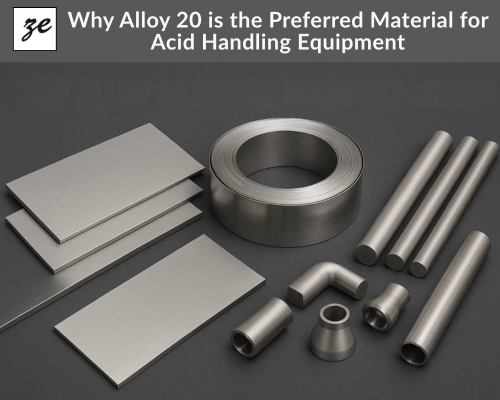Why Alloy 20 is the Preferred Material for Acid Handling Equipment
Industries that deal with strong acids such as sulfuric acid, nitric acid, or phosphoric acid require materials that can withstand extreme corrosion and harsh chemical reactions. Choosing the right material directly affects safety, durability, and performance of equipment.
That’s where Alloy 20 comes into the picture. Known for its outstanding corrosion resistance and strength, Alloy 20 is the preferred material for acid handling equipment across chemical, pharmaceutical, food, and power generation industries.
What is Alloy 20?
Alloy 20 is a high-performance nickel, iron, and chromium-based alloy that is specially made to resist damage from strong acids like sulfuric acid and nitric acid.
The main elements that make up Alloy 20 are:
- Nickel (32–38%): protects against corrosion
- Chromium (19–21%): adds strength and shine
- Copper (3–4%): improves acid resistance
- Molybdenum (2–3%): prevents pitting and cracking
- Iron (balance): provides durability and toughness
Because of this unique mix, Alloy 20 performs better than regular stainless steel in places where acids and chemicals are used every day.
It is widely used to make tanks, pipes, valves, and pumps in industries like chemical processing, food production, and pharmaceuticals.
Why Alloy 20 is the Preferred Material for Acid Handling Equipment
- Exceptional Corrosion Resistance
Corrosion is the biggest challenge in acid-handling industries. Alloy 20 resists pitting, crevice corrosion, and stress-corrosion cracking, especially in sulfuric acid solutions.
While other stainless steels like 316L may fail under similar conditions, Alloy 20 remains stable and retains its mechanical integrity, reducing equipment downtime and maintenance costs. - Excellent Resistance to Sulfuric and Nitric Acid
The most common application of acid handling equipment involves exposure to sulfuric acid. Alloy 20 Exports superior resistance across a wide concentration range from dilute to concentrated forms.
It also performs well in nitric acid, phosphoric acid, and chloride environments, making it a versatile choice for chemical processing industries. - High Mechanical Strength and Durability
Even under high pressure and temperature, Alloy 20 maintains its strength. Its austenitic structure ensures toughness and flexibility during fabrication.
This makes it ideal for manufacturing:- Acid storage tanks
- Heat exchangers
- Pumps and valves
- Reactors and piping systems
- Ease of Fabrication and Welding
Another major reason why Alloy 20 is the preferred material for acid handling equipment is its excellent fabricability. It can be easily welded, machined, and formed using standard shop practices.
This allows engineers to design complex systems without compromising strength or resistance, reducing overall project costs. - Over the Long Term
Though the initial cost of Alloy 20 may be higher than conventional stainless steel, its longevity and low maintenance requirements make it more economical in the long run.
Reduced repair frequency, minimized leakage risks, and improved safety lead to substantial savings for industries dealing with corrosive acids.
Why Choose Zeon Exports for Alloy 20 Products
At Zeon Exports, quality and reliability are our foundation. We are one of India’s trusted exporters of nickel-based alloys and specialty metals, serving clients across the globe.
Our Alloy 20 materials undergo stringent testing for corrosion resistance, tensile strength, and dimensional accuracy. With years of experience and global certifications, we ensure that every product meets the highest industrial expectations.
If you’re looking for a dependable partner for Alloy 20 for acid handling equipment, Zeon Exports is your one-stop solution.
Conclusion
In industries where acids can destroy ordinary metals, Alloy 20 stands as a true performer. Its corrosion resistance, mechanical strength, and cost-efficiency make it a superior choice for acid storage and processing systems.
With reliable suppliers like Zeon Exports, you can ensure long-lasting equipment performance and safety even in the harshest environments.
FAQs
Q1. What makes Alloy 20 suitable for acid environments?
Alloy 20 has a unique blend of nickel, chromium, and molybdenum that protects it from corrosion caused by sulfuric and nitric acids.
Q2. Is Alloy 20 better than stainless steel 316L?
Yes, in acid-handling applications, Alloy 20 performs far better than 316L because it resists pitting and cracking under high-temperature acidic conditions.
Q3. Where is Alloy 20 commonly used?
It is used in chemical plants, acid storage tanks, heat exchangers, and pharmaceutical equipment that come in contact with aggressive chemicals.
Q4. Does Alloy 20 require special maintenance?
No, Alloy 20 is known for its low maintenance needs due to its strong resistance to corrosion and scaling.
Q5. Can Alloy 20 be welded easily?
Yes, Alloy 20 is easy to fabricate and weld using conventional techniques, making it convenient for large industrial applications.


